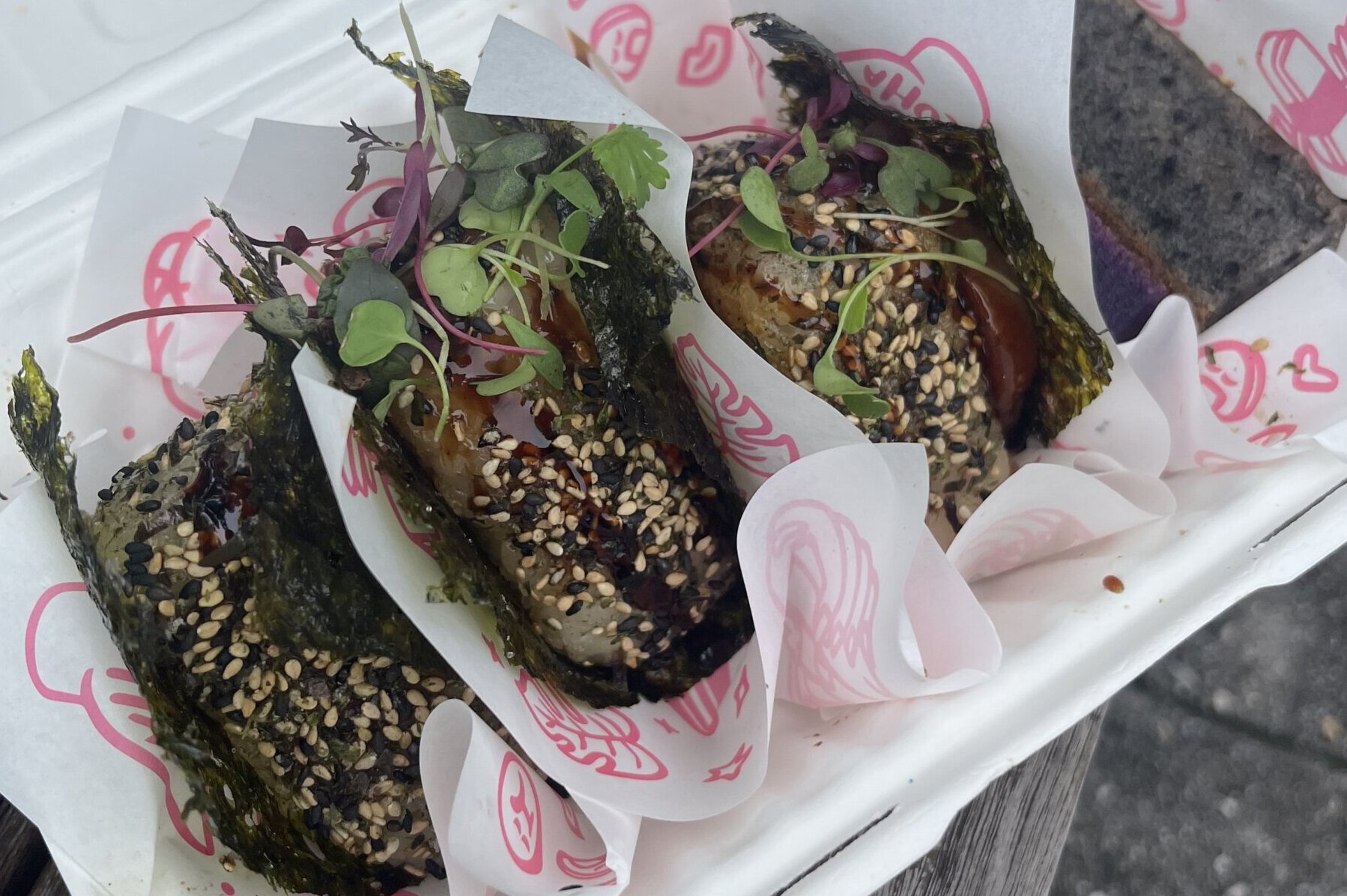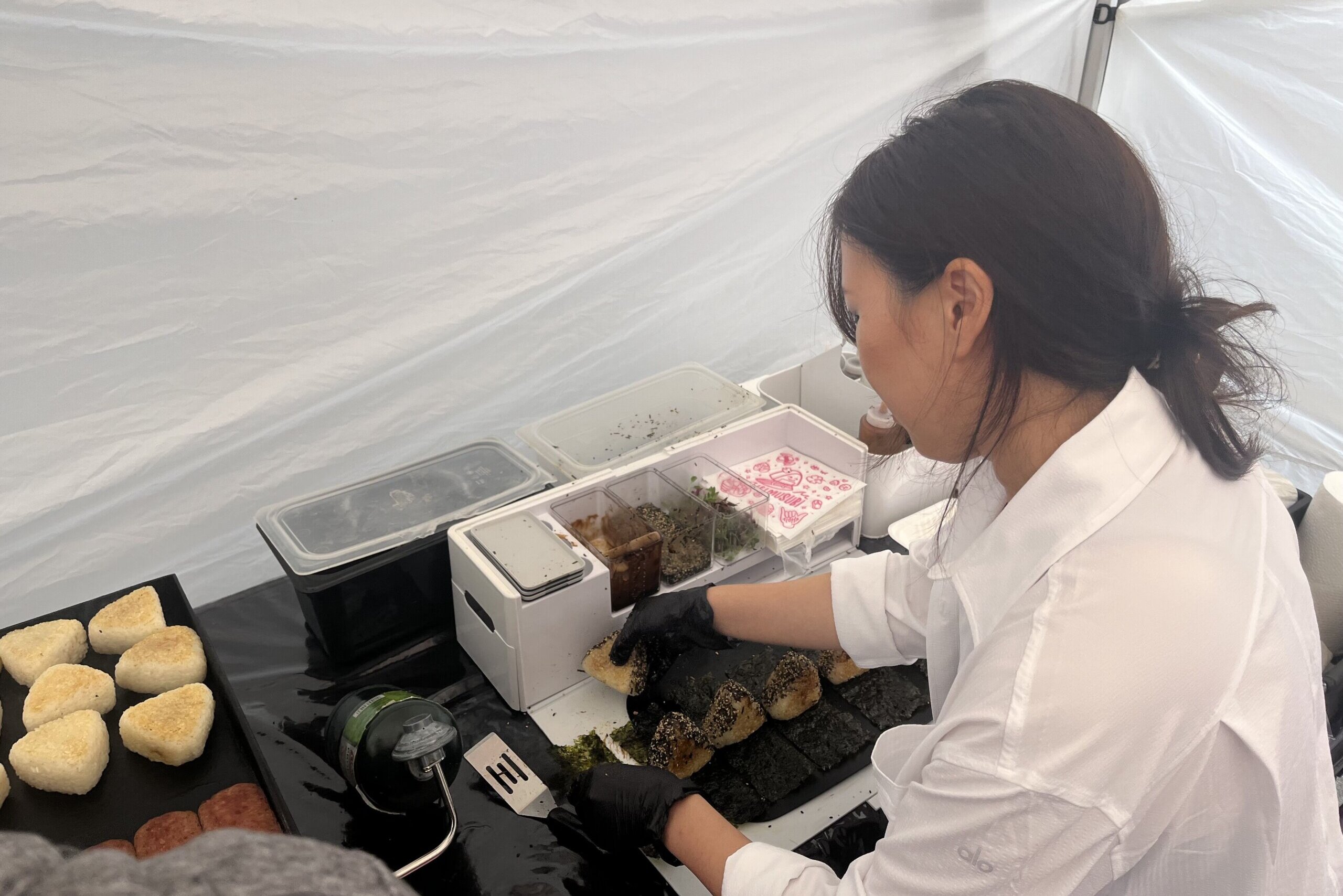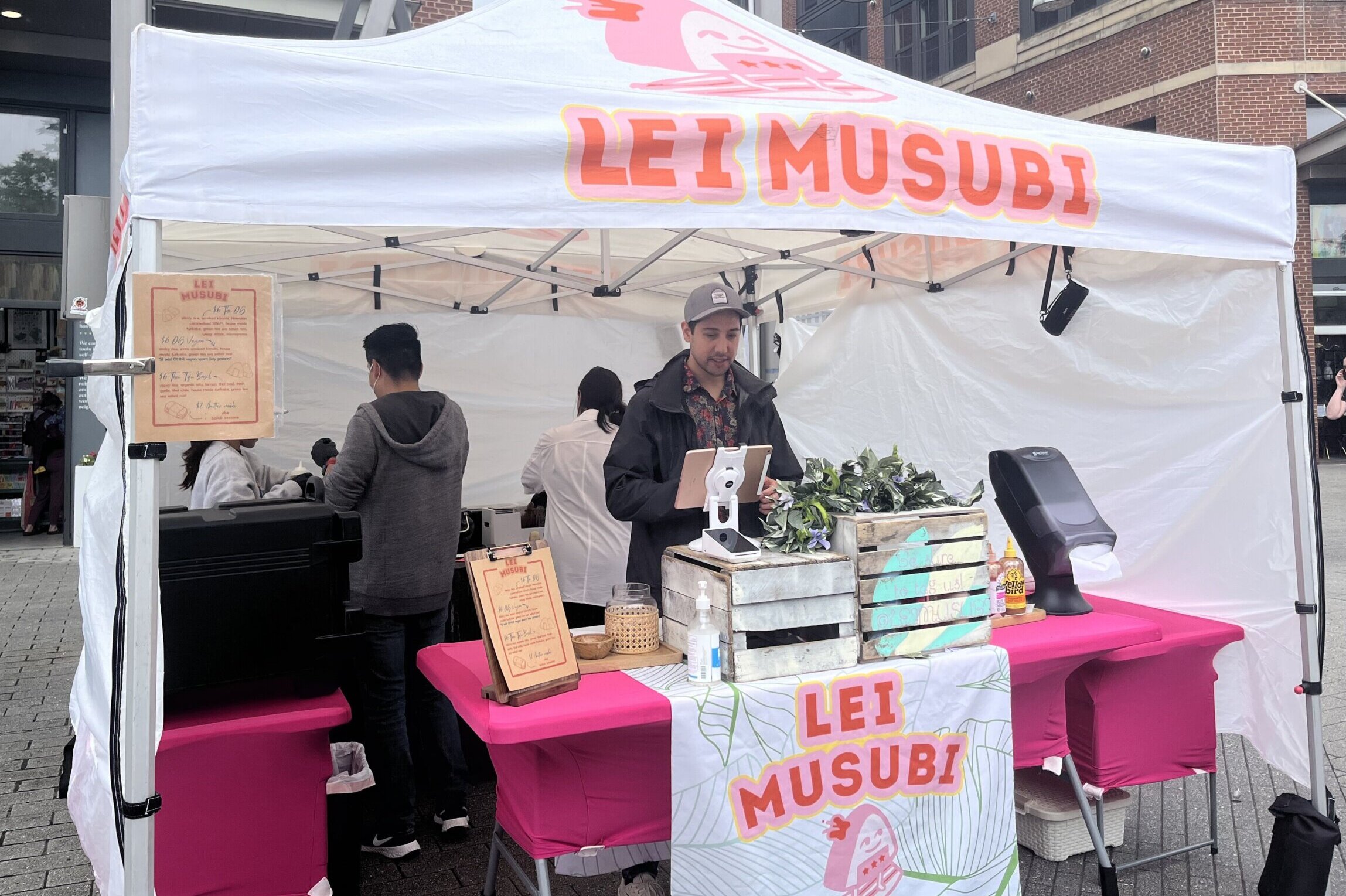This video is no longer available.
The first time Vivien Bang grilled the outside of a rice ball in a little bit of sesame oil six years ago, she knew she had struck gold.
“He was just like, ‘What are you doing? You have to do something with this,’” she remembers her then-boyfriend and now husband, Luke, telling her when he tried the new version of the snack she’d been making for years for friends and family.
Soon after, the Rockville, Maryland-based entrepreneur left her human resources job and started selling her delicious Hawaiian-inspired rice balls, called musubis, under the name Lei Musubi in D.C. with her husband.
“We first started off with pop-ups like once a month over in the Brookland area of D.C., specifically in the Arts Walk,” Bang said.
Now their stand is a longtime fixture at the Brookland farmer’s market and at events across the D.C. area, shelling out crispy, perfectly triangular musubis at up to five pop-ups a month.
The 34-year-old features new musubi flavors almost every week, but she always sells the OG, featuring slices of slow-braised Spam, and the OG vegan, with similarly prepared vegan Spam.
She described their most popular musubi as “sticky rice that’s filled with a smoked kimchi, wrapped with Hawaiian caramelized Spam and green tea salted nori, then drizzled with the unagi sauce and topped off with the micro greens.”

The perfect bite combines the funky umami flavor of smoked kimchi with salty grilled Spam, crispy rice and the surprising brightness of locally sourced microgreens.
Bang has an eye for the little details as well. Not only do the musubis play with so many contrasting flavors, but the furikake coating and crown of micro greens give the OG musubi an iconic look.
Her other experimental musubis also elevate flavors from across the world, from a elote musubi to a Thai basil and tofu musubi. Bang said she is always experimenting with how she can elevate the humble rice balls.
“I do a lot of my research local(ly) and from afar,” she explained. “Recently, my husband and I traveled to Japan and Korea. So we definitely brought back a lot of creative inspiration.”
Her sophisticated musubis are based on Bang’s much simpler childhood snack, which she has been refining since she was helping in her mom’s kitchen.
The family history behind the rice balls
Many of the ingredients in her original musubi are inspired by growing up in a Korean American household. But rice balls with different fillings also exist across food cultures, including jumeokbap in Korea, onigiri in Japan and even deep-fried arancini in Italy.
Bang said she dedicated her business and rice balls to the Hawaiian version because the original inspiration behind her mashup of Hawaiian-Korean flavors came from before she was even born, when her parents went to Hawaii for their honeymoon.
During that trip, they quickly fell in love with Spam musubis — a Japanese American snack from Hawaii traditionally consisting of neatly formed blocks of sticky rice topped with marinated sweet and salty Spam wrapped together with sheets of seaweed, also known as nori.
Bang said she remembers helping her mother make a crossover rice ball version of Spam musubis for family and friends while she was growing up in the Potomac, Maryland, area.
“A lot of the inspiration definitely comes from my mother. And just, I guess, being alongside her whenever she would host dinner parties when I was younger, and I was kind of like the sous chef,” Bang recounted.
The addition of smoked kimchi, a fermented cabbage-based Korean side dish that Bang slowly smokes on a grill, comes from another childhood memory.
“When I was younger, my dad would always try and get me to eat kimchi at the dinner table,” she said. “My dad tried at least a few times and then the fourth time came around, and he force-fed the kimchi to me, which was just like the raw pickled kimchi, it wasn’t cooked or anything. And when I tried it for the first time, I just threw up all over the dinner table.”
Bang said she learned quickly that raw kimchi was not for her, but she loved eating kimchi cooked in traditional Korean dishes, like kimchi-jjigae (a kimchi-based stew) and kimchi bouchimgae or kimchijeon (kimchi pancake).
“It’s like the flavor profile just completely changes when kimchi is cooked,” Bang explained. “Which is a reason why I cook and smoke the kimchi in the Hawaiian style rice balls that I sell.”
Bang remembers some customers asking her to remove the kimchi from inside the grilled rice balls, but now she said she’s turned many skeptics “into kimchi lovers.”
Building community with other small businesses
The family memories behind Bang’s musubis and her love for cooking for family and friends have translated into Lei Musubi building a strong community across the D.C. area.
It’s easy to see that at the Brookland farmer’s market, where Bang is constantly pivoting between the assembly line of musubi making, chatting with regulars being rung up by Luke, and smiling at customers as she hands off finished orders.

“My favorite part of my job is to be at the farmers market and have the opportunity to connect with my customer base. Because you know, without their support, we honestly wouldn’t be here,” she said. “And a lot of like my drive and motivation comes from a lot of the feedback that I get from the community that I sell the rice balls to, so it feels great.”
Her love for community building has led to Lei Musubi being invited repeatedly to pop-ups, from events at the National Museum of Asian Art, to breweries across D.C. and even events at restaurants like Maketto.
Bang said those collaborations with other small businesses and restaurants really challenge her, allowing her to step outside her comfort zone, do research and dive into trial-and-error in her own kitchen.
She fondly remembered one of her recent crossover events at Preservation Biscuit Company in Falls Church, Virginia, which she and her husband have been huge fans of for years. The special musubi at the event was inspired by the biscuit company’s hot honey-fried chicken.
“I made a little rice ball collaboration that included our Hawaiian style rice balls with chicken breasts that was brined in kimchi juice as well as buttermilk, so it adds a juiciness to the chicken tenders,” she recounted. “And then we drizzled it with gochujang hot honey sauce and it was kind of like an open faced rice ball.”
While Bang said she loved the experimentation that her portable stand allows, she’s been looking at brick and mortar locations in The District for Lei Musubi and slowly training more people to help with her operations.

When she does get to give up the reins a bit and reflect on the expansion of Lei Musubi, she’s most proud of the collaborative community she’s built in Brookland over the past six years.
“When I’m able to just sit back and think about what I’m doing it, it still amazes me. And it’s really cool that I get to share my favorite childhood snack with the community that I live in.”
Get breaking news and daily headlines delivered to your email inbox by signing up here.
© 2024 WTOP. All Rights Reserved. This website is not intended for users located within the European Economic Area.








